Essays
Essays

Fieldguides for a Preternaturalist 2
Fieldguides for a Preternaturalist is a series of small chapbooks designed to bring collaborators, audiences, and readers together within the project Nothing of Importance Occurred: Recuperating a Herball for a 17th Century Enslaved Angolan Midwife at the Cape. Initiated by South African artist Wendy Morris, Nothing of Importance Occurred is an artistic project recuperating missing narratives at the Cape through speculative investigations of plants-as-archive and storytelling as method. It has as its focus the retrieving of a library of botanical-medicinal knowledge that might have informed Morris’s enslaved ancestor, Maaij Claesje of Angola, midwife in the Company Slave Lodge in Cape Town.
The investigation follows streams of contraceptive plant knowledge that flowed to the Cape through the bodies of enslaved women from Angola, Moçambique, and Madagascar, and from India, Indonesia, and Sri Lanka, as well as through the bodies of women emigrating from the Netherlands, and Huguenots fleeing France. The investigation traces practices already existent at the Cape in the healing ecologies of Khoi, Nama, and San women. Because upwards of four million Angolans were trafficked to the Americas, the project follows recorded practices among women there too. This project of recuperation leads towards a polyvocal Herball of contraceptive plants, the collaborative Fieldguides, and a part-fictionalized Return from Cape Town to the interior of Angola.
The Fieldguides are conceived as generators of collaborations, which is to say that they are a means to invite guides to beam light onto the investigation from multiple angles—historical, anthropological, experiential, ethnobotanical, literary, and more. The guides are influential researchers and writers whose insights, experiences, and reflections shaped the investigation. The guides were invited to write towards the project in a word-of-mouth form; each contribution will, in turn, occasion a set of gatherings during which the text will be read aloud.

Fieldguides for a Preternaturalist 1
Fieldguides for a Preternaturalist is a series of small chapbooks designed to bring collaborators, audiences, and readers together within the project Nothing of Importance Occurred: Recuperating a Herball for a 17th Century Enslaved Angolan Midwife at the Cape. Initiated by South African artist Wendy Morris, Nothing of Importance Occurred is an artistic project recuperating missing narratives at the Cape through speculative investigations of plants-as-archive and storytelling as method. It has as its focus the retrieving of a library of botanical-medicinal knowledge that might have informed Morris’s enslaved ancestor, Maaij Claesje of Angola, midwife in the Company Slave Lodge in Cape Town.
The investigation follows streams of contraceptive plant knowledge that flowed to the Cape through the bodies of enslaved women from Angola, Moçambique, and Madagascar, and from India, Indonesia, and Sri Lanka, as well as through the bodies of women emigrating from the Netherlands, and Huguenots fleeing France. The investigation traces practices already existent at the Cape in the healing ecologies of Khoi, Nama, and San women. Because upwards of four million Angolans were trafficked to the Americas, the project follows recorded practices among women there too. This project of recuperation leads towards a polyvocal Herball of contraceptive plants, the collaborative Fieldguides, and a part-fictionalized Return from Cape Town to the interior of Angola.
The Fieldguides are conceived as generators of collaborations, which is to say that they are a means to invite guides to beam light onto the investigation from multiple angles—historical, anthropological, experiential, ethnobotanical, literary, and more. The guides are influential researchers and writers whose insights, experiences, and reflections shaped the investigation. The guides were invited to write towards the project in a word-of-mouth form; each contribution will, in turn, occasion a set of gatherings during which the text will be read aloud.

Notes on Mother Tongues: Colonialism, Class, and Giving What You Don't Have
Lebanese writer and editor Mirene Arsanios meditates on the relationships between mother tongues, motherhood, and colonialism. In this pamphlet, she investigates the historical and personal circumstances that led to the loss of her native language.
Written as a fictional essay, NOTES ON MOTHER TONGUES explores language as a field shaped by diasporic histories, class relations, and broken familial legacies. It strives to imagine mother tongues and motherhood beyond the labor of reproduction, languages that exist in troubled ecosystems where lack does not preclude repair.
Mirene Arsanios is the author of the short story collection, The City Outside the Sentence (Ashkal Alwan). She has contributed essays and short stories to e-flux journal, Vida, The Brooklyn Rail, The Rumpus, Guernica, among others. Arsanios co-founded the collective 98weeks Research Project in Beirut and is the founding editor of Makhzin, a bilingual English/Arabic magazine for innovative writing. She teaches at Pratt Institute and holds an MFA in Writing from the Milton Avery Graduate School for the Arts at Bard College. Arsanios currently lives in New York where she was a 2016 LMCC Workspace fellow, and an ART OMI resident in Fall 2017. With Rachel Valinsky, she coordinated the Friday night reading series at the Poetry Project from 2017-19.

Take Em' Down: Scattered Monuments and Queer Forgetting
Who determines what is remembered and commemorated, and why? How can we commemorate something that is both in the past and a daily reality? In Take 'Em Down, Simon(e) van Saarloos is inspired by the historically invisibilized lives of LGBT people and queers. They demonstrate the power of forgetting and wonder if and how it’s possible to live without a past. At the same time, Van Saarloos criticizes the way that a ‘white memory’—including their own—treats some stories as self-evident while other histories are erased.
"Amidst a global pandemic that has fundamentally changed our world, along with Black Lives Matter, Me Too, Topple Monuments Movements and ongoing struggles for LGBTQIA liberation, Simon(e) van Saarloos' Take 'Em Downasks us to reenvision monuments and acts of commemoration. They also champion forms of Queer forgetting as acts of resistance. They call upon the work of some of the greatest thinkers, scholars and writers Arendt, Orwell, Halberstam, Rankine, Moten, Hartman and more to raise critical issues around memory, mourning and social justice. In this text Saarloos joins their ranks in creating important new visions and challenges for our world. It’s a text demanding to be contemplated and shared widely."
Pamela Sneed, Author of Funeral Diva, City Lights 2020
Simon(e) van Saarloos is the author of Playing Monogamy (PS Rotterdam). They were the curator of the 2021 exhibition on Abundance (‘We must bring about the end of the world as we know it’ – Denise Ferreira da Silva) in Het HEM and are also the host of *The Asterisk Conversations podcast. Van Saarloos recently started a PhD in the Rhetoric department at UC Berkeley.
Translation by Liz Waters. Introduction by Pamela Sneed, New York-based poet, performer, visual artist, and educator.
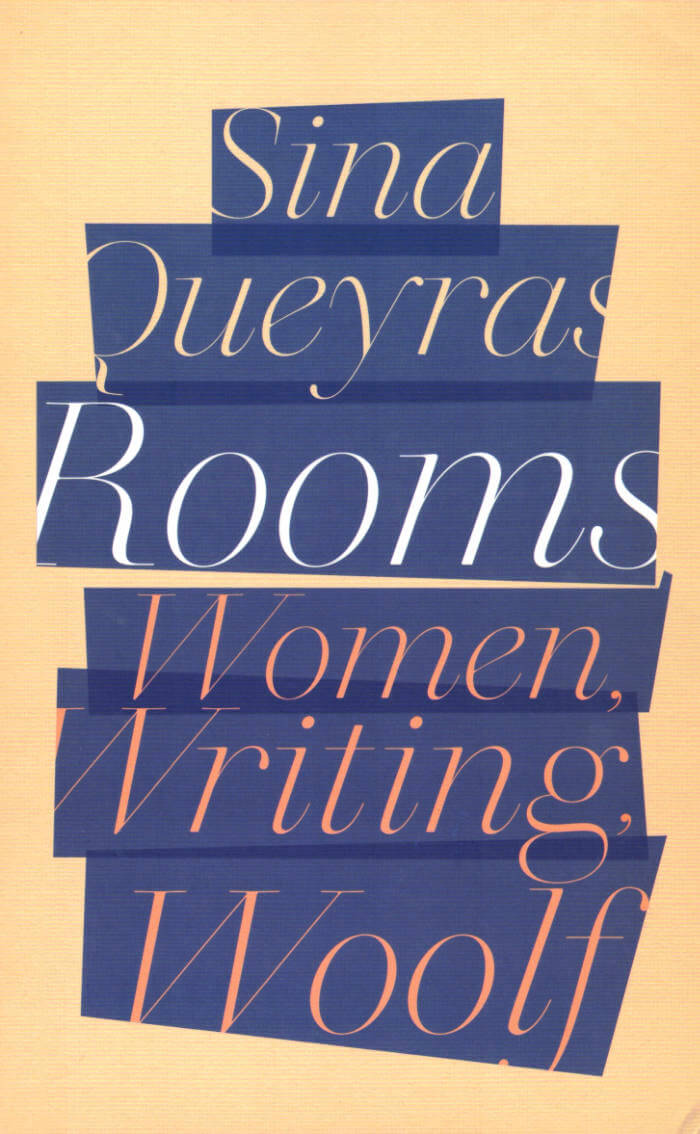
Rooms: Women, Writing, Woolf
From LAMBDA Literary Award winner Sina Queyras, Rooms offers a peek into the defining spaces a young queer writer moved through as they found their way from a life of chaos to a life of the mind.
Thirty years ago, a professor threw a chair at Sina Queyras after they'd turned in an essay on Virginia Woolf.
Queyras returns to that contentious first encounter with Virignia Woolf to recover the body and thinking of that time. Using Woolf's A Room of One's Own as a touchstone, this book is both an homage to and provocation of the idea of a room of one's own at the centre of our idea of a literary life.
How central is the room? And what happens once we get one? Do we inhabit our rooms? Or do the rooms contain us? Blending memoir, prose, tweets, poetry, and criticism, Rooms offers a peek into the defining spaces a young queer writer moved through as they found their way from a life of chaos to a life of the mind, and from a very private life of the mind to a public life of the page, and from a life of the page into a life in the Academy, the Internet, and on social media.
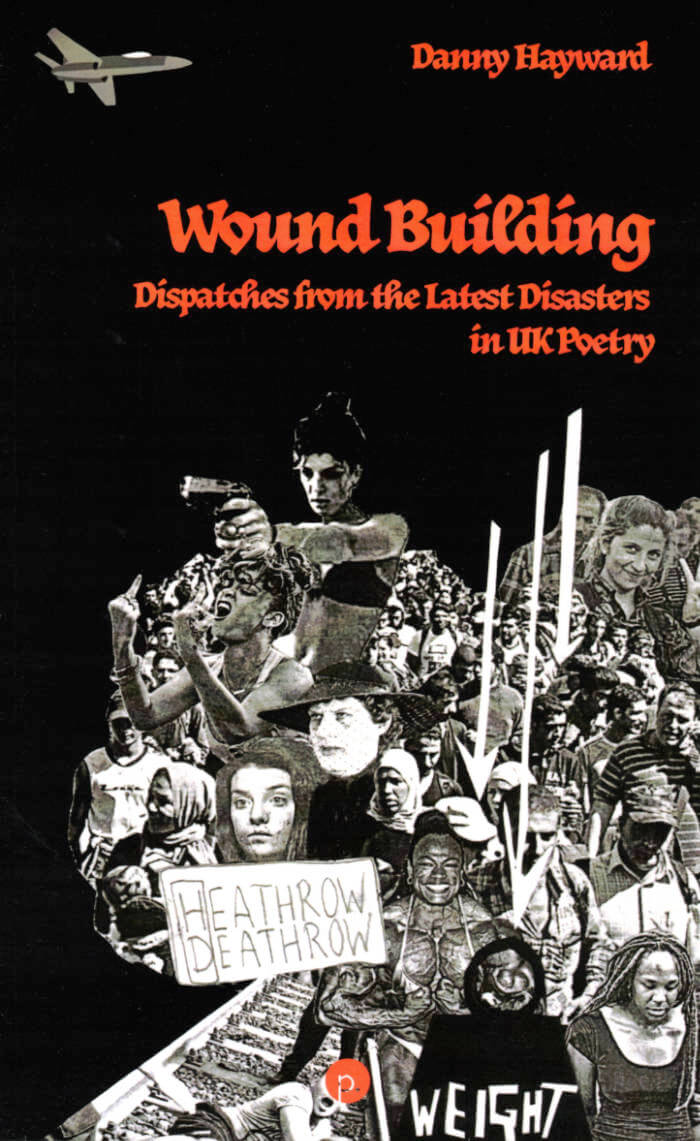
Wound Building: Dispatches from the Latest Disasters in UK Poetry
Wound Building is a volume of essays, with digressions, on one group of contemporary poets active in a self-organizing political poetry scene in the UK, most of whom have little to no audience outside of the little magazines that they publish and the reading series they put on. The book is a front-line report on the rapid development of this poetry in the period between 2015 and 2020, with a particular focus on the relationship of poetry to violence and its representation. The poets discussed here write violent love poems and violent elegies as well as violent fantasies composed in stabs of violent verse and violet prose. The poems themselves comprise fantasies of killing David Cameron, dreams of being split open along a seam, basement songs, hundreds of pages of notes on working life in a privatized care home in Hove, East Sussex, a four-line slogan about the Cologne groping scandal of New Year 2016, variations on the Refugees Medical Phrasebook, a life wasted in a factory in Guangzhou, an autobiographical sci-fi internet fever dream, an anarchist elegy, and a refusal to argue. Ultimately, Hayward argues that the lessons this poetry teaches is never to write a "worthy" narrative when a fucked up collage will do. Rather than a cohesive "account" of a "school" of poets, or a "contribution" to the boring tittle-tattle of aesthetic debates over British poetry as an institution, Wound Building is a front-line report on the local disasters of a contemporary UK poetry caught in the grip of the historical cataclysm of capitalist culture.
Wound Building is further concerned with aesthetic problems related to Marxism, anarchism, contemporary trans politics, and class, though its "theoretical" preoccupations are subordinated to its desire to provide a ground-level view on the writing itself, its production, its intellectual aporia, and the ways it finds itself outstripped by the ongoing "march of events." The book will be of interest not only for those concerned with contemporary British political and experimental poetry, but also more generally for anyone who wishes to think carefully about what it means to make art about present-day history and its many horrible enormities.
The book's title is derived from the idea of sublime woundedness that subtends the context of the poets discussed here: the impressions of wounds opening up like LED-lit shopfronts in the night, in a parallel universe in which injury is intoxicatingly impersonal and structural, and which forms the environment in which the poems fight to absolutize the value of every last breath, or face into the reality of extravagantly violent wish fulfillment, or dissolve themselves in a search for new ways of professing love, or transform into a kind of expressionism of vomiting up medical-diagnostic categories found in abstract social labor, or pump their verses full of the convulsive rhythms of surprise and sudden relief, without any guarantee that this is the right thing to do or that anyone will even fucking hear. Wound Building does not historicize this state of affairs as much as it attempts to live alongside the immediacy of this work, in order to see what is still possible for poetry, and criticism, to make and do.
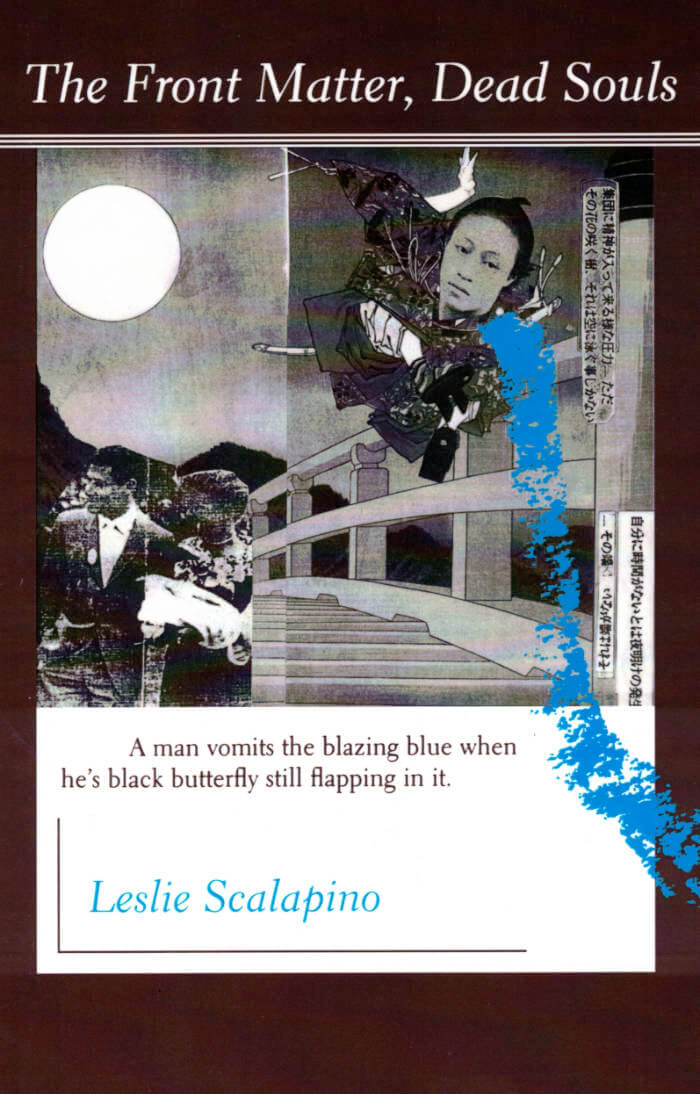
The Front Matter, Dead Souls
This extraordinary new book is essay-fiction-poetry, an experiment in form, a serial novel for publication in the newspaper that collapses the distinction between documentary and fiction.
Leslie Scalapino is widely regarded as one of the best avant-garde writers in America today. This extraordinary new book is essay-fiction-poetry, an experiment in form, a serial novel for publication in the newspaper that collapses the distinction between documentary and fiction. Loosely set in Los Angeles, the book scrutinizes our image-making, producing extreme and vivid images-hyena, Muscle Beach in Venice, the Supreme Court, subway rides-in order for them to be real. Countering contemporary trends toward interiority, Scalapino's work constitutes a unique effort to be objectively in the world. The writing is an action, a dynamic push to make intimacy in the public realm. She does not distinguish between poetry and real events: her writing is analogous to Buddhist notions of dreaming one is a butterfly, and becoming aware that actually being the butterfly is as real as dreaming it.

As Celebration, As Critique, As Play: Ron Hunt, Selected Writings (1957-2020)
The first standalone title on the BFTK imprint, ‘As Celebration, As Critique, As Play’ pulls together selected writings by Ron Hunt across his varied career as a writer, librarian, curator, critic and self described ‘lapsed anarchist’. Structured as a ‘biographic bibliography’ supplemented with annotations and contextual notes, ‘As Celebration, As Critique, As Play’ combines commissioned writing and previously unpublished texts that range from exhibition catalogue essays and détourned Q&As, to A–Z indexes and cherry-picked readers. Writings reproduced in full include:
Francis Picabia: Introduction (1964)
Yves Klein: A Mythopoeic of the Plurisignative (1967)
The Arts in Our Time (1968)
We Are Revealing New Pages of Art in Anarchy’s New Dawns (1968)
Interview with Brigitte Bardot (1969) (preview)
Poetry must be made by all! / Transform the world! (1969)
An Interview with Pontus Hultén, Stockholm 1981 (1971)
For Factography! (1976)
Andreas Gursky (1999)
Kalf: A Late Perspective (2000)
Dreams of / Fears of …… Flying (2009)
Fourier / Breton / Cherries (2017)
Hélène Cixous or Waiting for Tears (2018)
Some Books of Barbara Bloom (2019)
A Very Brief Dictionary in the Vicinity of Situationism (2019)
‘Recovery’ / Is Recovery Possible (2020)
with photographs by Tom McCaughan
typeset in Janson Max Neue by Dinamo & Sam de Groot
224 pgs, 21 × 15 cm, Softcover

How to Mend: Motherhood and Its Ghosts
In How to Mend: On Motherhood and its Ghosts, Kayfa ta’s 4th monograph, Iman Mersal navigates a long and winding road, from the only surviving picture of the author has with her mother, to a deep search through what memory, photography, dreams and writing, a search of what is lost between the mainstream and more personal representations of motherhood and its struggles. How to mend the gap between the representation and the real, the photograph and its subject, the self and the other, the mother and her child.
Iman Mersal is an Egyptian poet and associate professor of Arabic Literature and Middle Eastern Studies in the University of Alberta, Canada.
Text: Iman Mersal
Editors: Maha Maamoun and Ala Younis
Translated from Arabic by Robin Moger
Co-publishers: Kayfa ta and Sternberg Press
Design: Julie Peeters
Size: 9.6 x 14.8 cm
Pages: 168 pages, Soft cover

How to disappear
This publication proposes a set of aural exercises that show readers how to disappear, reappear, join a group, or leave a group. Its annex is a lexicon of some of the sounds that dwell in or are banished from the middle-class household.
Text: Haytham El-Wardany
Editors: Maha Maamoun and Ala Younis
Translated from Arabic by Jennifer Peterson (Preliminary Exercises) and Robin Moger (Sounds of the Middle Classes)
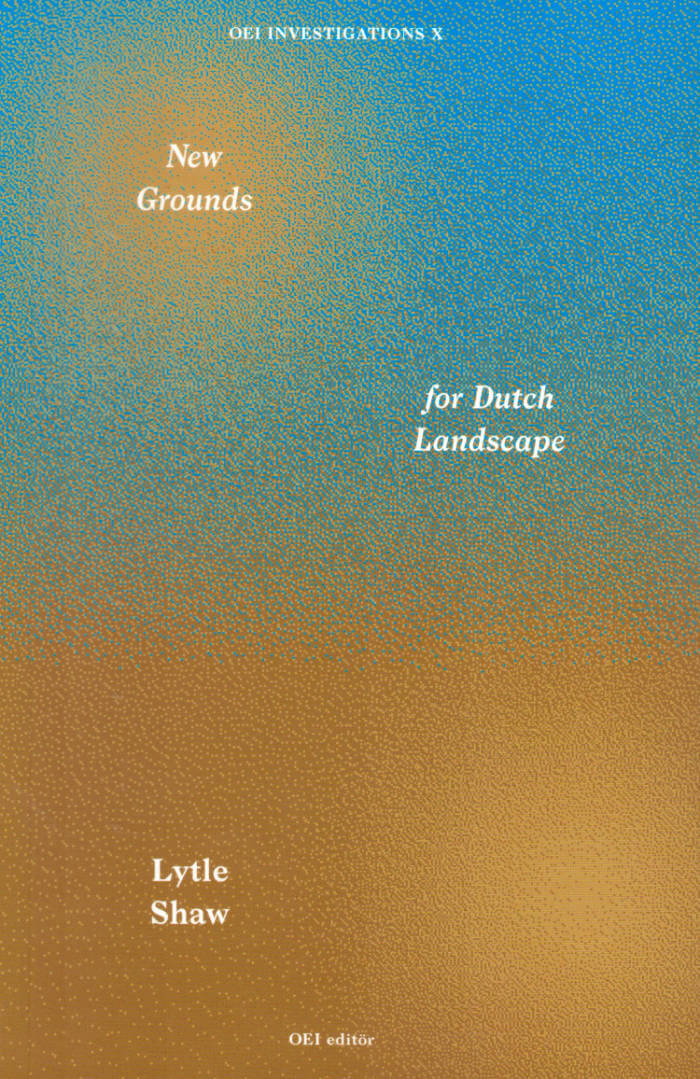
New Grounds for Dutch Landscape
New Grounds for Dutch Landscape uses an experimental, site-specific method to demonstrate how 17th century painters Jan van Goyen, Jacob van Ruisdael, and Meindert Hobbema did not so much represent the newly made landscape of Holland as reenact, through their painterly factures, its reclamation and ongoing threats to its stability: from flooding and drainage to abrasion and erosion.
These low-level dramas of recalcitrant matter allowed the Dutch to develop an ongoing temporality at odds with history painting’s decisive instant and a vocabulary of substance that wrested meaning away from humanist landscape painting’s expressive figures. — [publisher's note]

OEI #86/87 Publishing Practices, Publishing Poetics
Tobi Maier, Cecilia Grönberg and 1 more
Once more, an astonishing issue of OEI – a thrilling, compelling, stimulating feast of ideas regarding publishing and the book: the perfect big companion to read and hug in bed while the virus spreads outside.
Bringing together contributions from circa 130 publishing structures, publishing communities, magazines, small press endeavors, artists, poets, writers, editors, theoreticians, curators, scholars, and art bookstores, OEI # 86–87 reflects upon the challenges, pressures and possibilities of publishing and creating publics in different contexts and places in a time of far-reaching – economical, medial, political, social, technological – transformations.
The potential and the versatility of publishing open it to a diversity of practices and approaches in the arts, but as an eminently social form of art, a collective or micro-collective work with shared responsibilities, it is also a never-ending process of “crafting a variegated approach to how you create, publish, distribute, and build a social ecosystem around your efforts”, of trying to “build up and strengthen the community around these printed forms” (Temporary Services).
It is the conviction of OEI #86–87 that print has the power to play an important part in the construction of social spaces, of a social world. As Benjamin Thorel puts it in one of the essays in the issue, “conceiving of the dynamics of publishing as making publics as well as making things public is not a pun – insofar as the artists/publishers encompass, beyond the book itself, its possible ‘lives’, imagining the different spaces, and the different people, amongst whom a publication will circulate.” This is what Michael Warner has called “a public [as] poetic worldmaking”, implying “that all discourse or performance addressed to a public must characterize the world in which it attempts to circulate, projecting for that world a concrete and livable shape, and attempting to realize that world through address.”
This is also, as stressed by Annette Gilbert and others, what can make publishing such an active force, a force co-constituting texts and publications and publics. Indeed, with Michalis Pichler, it is tempting to say that in publishing as practice – perhaps more than in any other art field – “artists have been able to assert the aesthetic value of their own socio-politically informed concerns and to engage, often under precarious conditions, in cultural activities fully aligned with their political values.”
OEI #86–87 also includes sections on and with contemporary poetry from Canada; Fluxus publishing; Krister Brandt/Astrid Gogglesworth; Kalas på BORD (Öyvind Fahlström); Lars Fredrikson; Claude Royet-Journoud’s poetry magazines; Carl Einstein; Gail Scott; Ållebergshändelser; OEI #79: edit/publish/distribute!; “det offentligas försvinnande” and many many other things. [publisher’s note]
Design by Konst & Teknik

Five Essays from Present Continuous
The five essays printed here are excerpted from Part I of Present Continuous, a book of prose written during the first year of the coronavirus pandemic between March 2020 and April 2021 in Lewisham, London.
The essays in the present volume were written between March 2020 and June 2020: the movement from spring to summer, from the first announcement of a national lockdown to the Black Lives Matter protests sparked by the murder of George Floyd and Breonna Taylor in the United States and the death of Belly Mujinga in the UK. Nearly two years on, following a seemingly endless series of virus variants and subvariants, an apparent shift from pandemic to endemic, and a kind of exhaustion of vocabulary and will, I hope they provide some sort of record, not just of where “we” were in 2020, but where “we” are – or might be – now. (David Grundy, London, January 2022)
“It’s 2018 and we’re still on a train out of London, it’s 1967 or 1970 and Coltrane and Ayler are still in their material form, it’s 1943 and Artaud’s letters spill their remainder on the page, it’s April 2020 and all those presences are gone but their traces remain in the split voice, the overtone, the greater frequency overwhelming that base note which no longer guides in circumscribed lines. The actual presence of actual ghosts, silver on the mirrors, lost poetry, the noise it makes. It’s from the condition of being in the abyss itself that we learn how to climb out of it.”
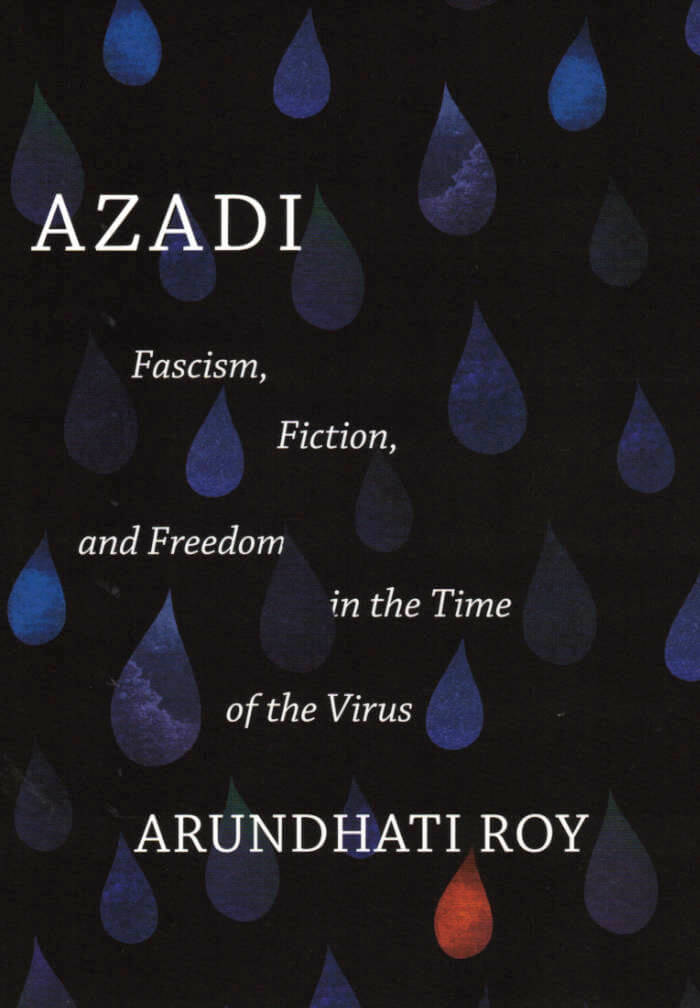
Azadi: Freedom. Fascism. Fiction.
The chant of 'Azadi!' — Urdu for 'Freedom!' — is the slogan of the freedom struggle in Kashmir against what Kashmiris see as the Indian Occupation. Ironically, it has also become the chant of millions on the streets of India against the project of Hindu nationalism. Just as Arundhati Roy began to ask what lay between these two calls for freedom — a chasm or a bridge? — the streets fell silent. Not only in India but all over the world.
The coronavirus brought with it another, more terrible understanding of azadi, making nonsense of international borders, incarcerating whole populations, and bringing the modern world to a halt like nothing else ever could.
In a series of essays, Arundhati Roy challenges us to reflect on the meaning of freedom in a world of growing authoritarianism

School Of Equals
Stijn Van Dorpe, Sarah Késenne
This book navigates the debate on (in)equality and arts education in a variety of ways. The process that editors Stijn van Dorpe and Sarah Késenne used to compile it follows a dialogue in which they provided contexts to one another but also strayed into the complexity of stories, viewpoints, and contradictions. They distinguish three different “politics”; three ways they believe the research has critical power and the potential to trigger action: through active, analytical, and corrective power; (in)consistencies; and (shared) praxis.
The book forms part of a series of projects and activities that they began as an initiative within the Audiovisual and Visual Arts Master at the LUCA School of Arts in Belgium.

The Buddhist
While ending an affair with a Buddhist teacher, Dodie Bellamy wrote about it simultaneously on her blog. This experiment in writing in extremis explores nuances of public shame, the vagaries of desire and rage, and Bellamy's confusion over the authenticity of group and individual spirituality. What is personal, what is public? In the electronic age, can anybody tell the difference?
The Buddhist celebrates marginalized subjectivity as enacted in the work of female artists from Bessie Smith to Eva Hesse and Carolee Schneeman, to Bhanu Kapil and Ariana Reines. The Allone Co. Edition contains the essence of the blog, as well as more extended narratives too explicit to post on line.
Design by Wayne Smith

Radicalizing Care – Feminist and Queer Activism in Curating
Sophie Lingg, Elke Krasny and 3 more
What happens when feminist and queer care ethics are put into curating practice? What happens when the notion of care based on the politics of relatedness, interdependence, reciprocity, and response-ability informs the practices of curating?
Delivered through critical theoretical essays, practice-informed case studies, and manifestos, the essays in this book offer insights from diverse contexts and geographies.
Contributions by Edna Bonhomme, Birgit Bosold, Imayna Caceres, Pêdra Costa, COVEN BERLIN, Nika Dubrovsky, Lena Fritsch, Vanessa Gravenor, Julia Hartmann, Hitomi Hasegawa, Vera Hofmann, Hana Janečková, k\are (Agnieszka Habraschka and Mia von Matt), Gilly Karjevsky, Elke Krasny, Chantal Küng, Sophie Lingg, Claudia Lomoschitz, Cathy Mattes, Elizaveta Mhaili, Jelena Micić, Carlota Mir, Fabio Otti, Ven Paldrano, Nataša Petrešin-Bachelez, Nina Prader, Lesia Prokopenko, Patricia J. Reis, Elif Sarican, Rosario Talevi, Amelia Wallin, Verena Melgarejo Weinandt, Stefanie Wuschitz.

(Forced) Movement
What would be of contemporary culture if we did not recognize the impact of migration in cultural and socio-economic crossings? This book explores human migration in different times, contexts, and geographies surrounding the Aegean Sea. Through an assemblage of voices, lived experiences, historical documents, urban and rural dislocations, this publication examines responses to mobility of the ones on the move, and of the ones living in the destinations the former are heading to. It speaks of the sacrifices one is forced to make en route and at its antipode; the implications of voluntary migration to a place, steered by investment in real estate.
(Forced) Movement
by Antigone Samellas
Amygdalia
by Christina Phoebe
To live in the Borderlands means you
by Gloria Anzaldua
In the Great Mara River
by Liwaa Yazji
Real-Estate Cosmopolitanisms
by George Papam
Uprootings/Xerizomoi
by Nicolas Lakiotakis

Architectures of Healing
Today, many feel fettered by insomnia, untouchability, and restrictions on movement. Looking for a more holistic approach to bodily and mental health, this book explores architectures and elementary forms of care and healing in different time periods: from the powers of sleep, touch, and travel in Asklepieia, the ancient healing temples for divine dream encounters alleviating the pain of the ailing pilgrim; to the attentiveness carried through the healing touch from the establishment of Byzantine hospitals till our times; to a pilgrimage center in modern-day Lesbos on a personal search for healing from the traumas of war and patriarchy; to the liberating and self-preserving powers of sleep as a healing response to past and current systems of oppression.
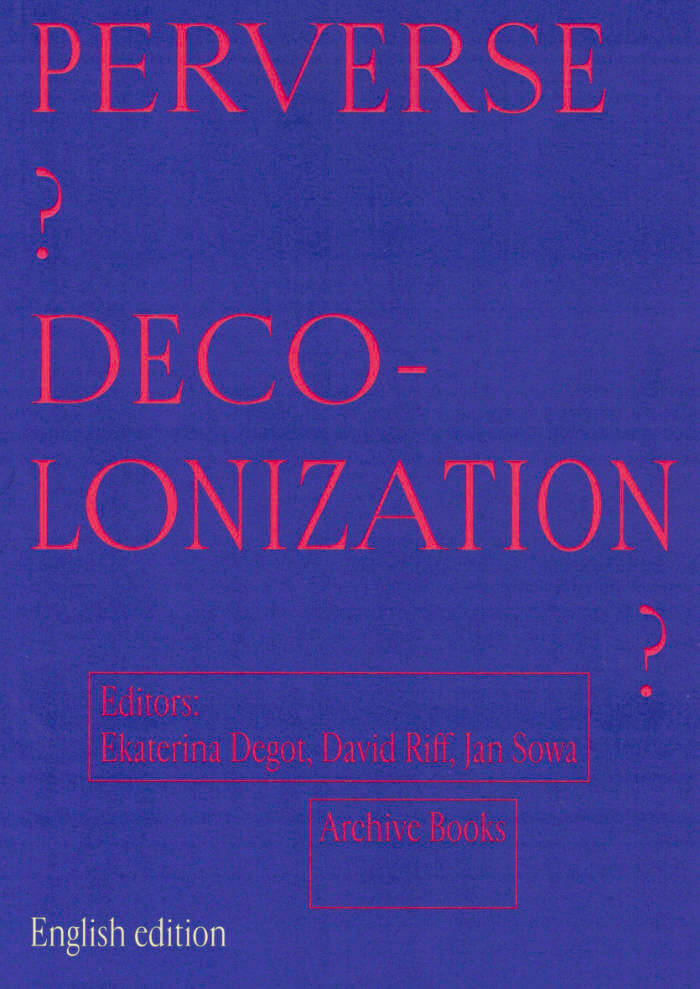
Perverse Decolonization?
Jan Sowa, David Riff and 1 more
Conversations and essays that question the twisted and oppressive climate in a world where true decolonization has yet to begin.
New nationalisms, toxic patriotisms and systems of exclusion have been on the rise for the last decade, reinforced by technology and rooted in colonialism, slavery and class oppression. Our time offers a unique twist on these age-old structures: rhetorics of decolonization are now weaponized by autocratic regimes, just as they are normalized in the phantasmagoria of cultural practices. It is this paradoxical and entangled situation that we, perhaps somewhat emotionally, started to refer to as "perverse decolonization." This book is the result of a (self-)critical project of discussions, workshops, exhibitions and meetings in Cologne, Poland, Israel, Hong Kong and Chicago. Its conversations and essays question the twisted and oppressive climate in a world where true decolonization has yet to begin.
Contributions by Avital Barak, Saddie Choua, Cosmin Costinaş, Ekaterina Degot, Natasha Ginwala, Andrzej Leder, Georgy Mamedov, Walter Benn Michaels, Joanna Rajkowska, David Riff, Aneta Rostkowska, Joshua Simon, Jan Sowa, Hito Steyerl, Mark Terkessidis, Mi You.
Published in February 2022
English edition
15 x 21 cm (softcover)
164 pages
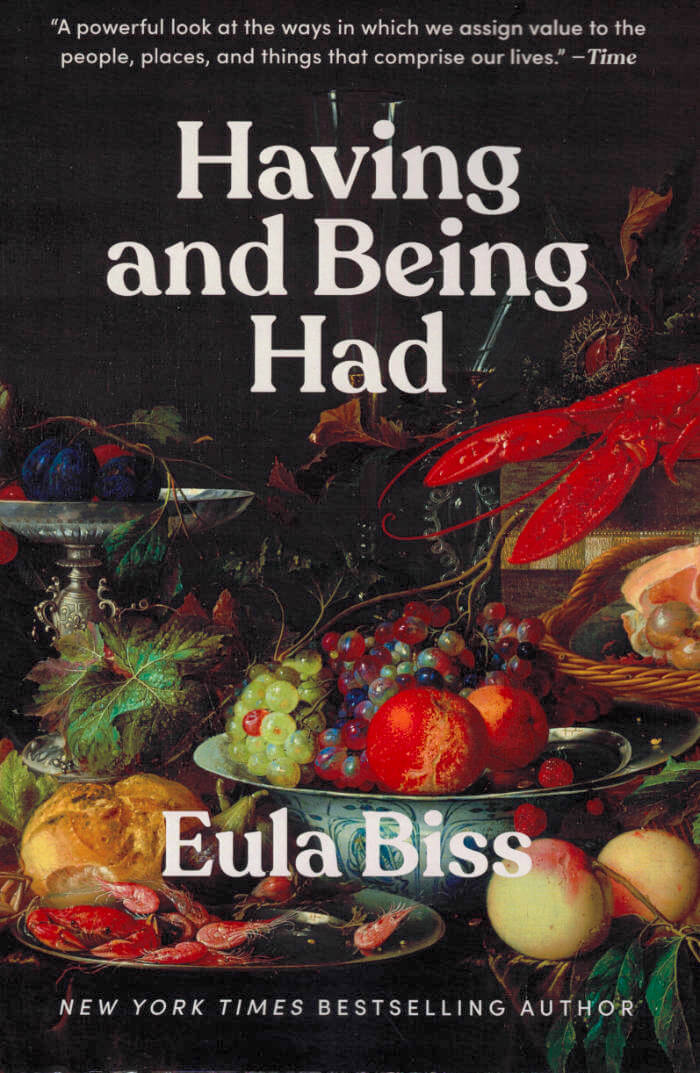
Having and Being Had
“My adult life can be divided into two distinct parts,” Eula Biss writes, “the time before I owned a washing machine and the time after.” Having just purchased her first home, the poet and essayist now embarks on a provocative exploration of the value system she has bought into. Through a series of engaging exchanges—in libraries and laundromats, over barstools and backyard fences—she examines our assumptions about class and property and the ways we internalize the demands of capitalism. Described by the New York Times as a writer who “advances from all sides, like a chess player,” Biss offers an uncommonly immersive and deeply revealing new portrait of work and luxury, of accumulation and consumption, of the value of time and how we spend it. Ranging from IKEA to Beyoncé to Pokemon, Biss asks, of both herself and her class, “In what have we invested?”
Eula Biss is the author of four books, including the New York Times bestseller On Immunity: An Inoculation, which was named one of the 10 Best Books of 2014 by The New York Times Book Review, and Notes from No Man's Land: American Essays, which won the National Book Critics Circle Award for criticism. Her work has appeared in Harper's Magazine, The New York Times, The Believer, and elsewhere, and has been supported by an NEA Literature Fellowship, a Howard Foundation Fellowship, and a Guggenheim Fellowship.
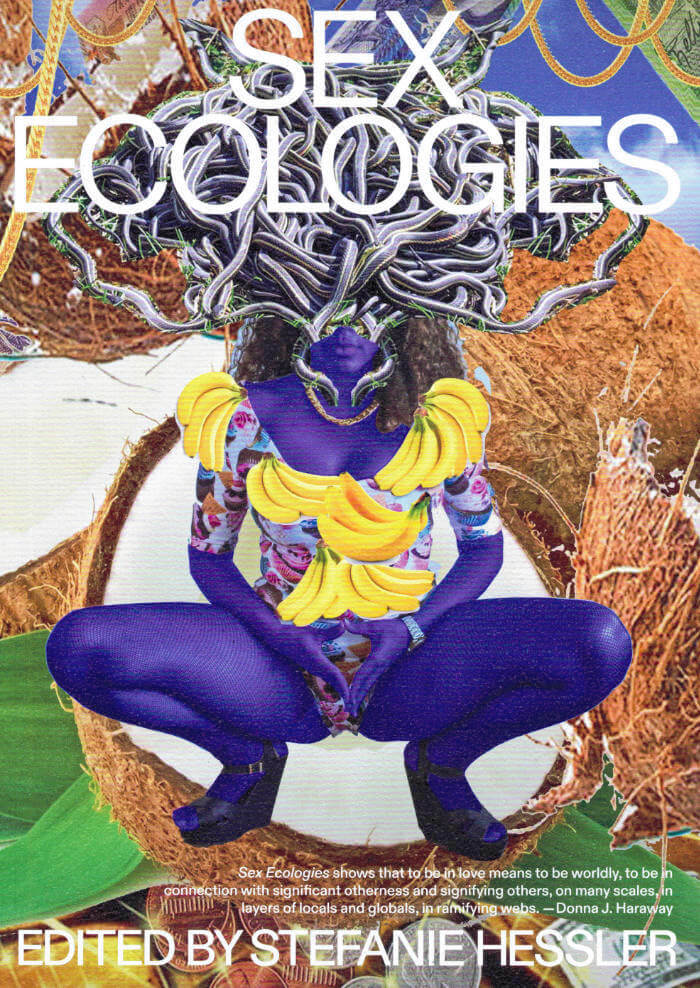
Sex Ecologies
Sex Ecologies explores pleasure, affect, and the powers of the erotic in the human and more-than-human worlds. Arguing for the positive and constructive role of sex in ecology and art practice, these texts and artistic research projects attempt nothing short of reclaiming the sexual from Western erotophobia and heteronormative narratives of nature and reproduction. The artists and writers set out to examine queer ecology through the lens of environmental humanities, investigating the fluid boundaries between bodies (both human and nonhuman), between binary conceptions of nature as separate from culture, and between disciplines.
In newly commissioned texts from such writers as Mel Y. Chen and Jack Halberstam and a selection of influential essays—including an annotated version of Audre Lorde's “The Uses of the Erotic: The Erotic as Power”—as well as images and sketches from works in progress by a diverse group of artists, Sex Ecologiescombines insights from the fields of art, environmental humanities, ecofeminism, gender studies, science, technology, political science, and indigenous studies.
Sex Ecologies, which accompanies an exhibition of the same name at Kunsthall Trondheim, emerges from an arts-driven research project collaboratively developed between the art center and the Seed Box environmental humanities collaboratory. Conceived not as a result but as a seed arising from this transdisciplinary fertilization, the volume presents a case for the role of sex in environmental and social justice.
Contributors:
Katja Aglert,Tarsh Bates, adrienne maree brown, Mel Y. Chen, Pauline Doutreluingne, Léuli Eshrāghi, Jes Fan, Ibrahim Fazlic, Jack Halberstam, niilas helander, Stefanie Hessler, Jenny Hval, Anne Duk Hee Jordan, Jessie Kleemann, Audre Lorde, Nina Lykke, Montserrat Madariaga-Caro, Camila Marambio, Astrida Neimanis, Pedro Neves Marques, Okwui Okpokwasili, Marie Helene Pereira, Margrethe Pettersen, Laure Prouvost, Filipa Ramos, Catriona Sandilands, Sami Schalk, Serubiri Moses, Leanne Betasamosake Simpson, Annie Sprinkle and Beth Stephens, Kim TallBear, Anna Tje, Alberta Whittle, Victoria Wibeck, Elvia Wilk
Copublished with Kunsthall Trondheim (Norway) and the Seed Box (Sweden)
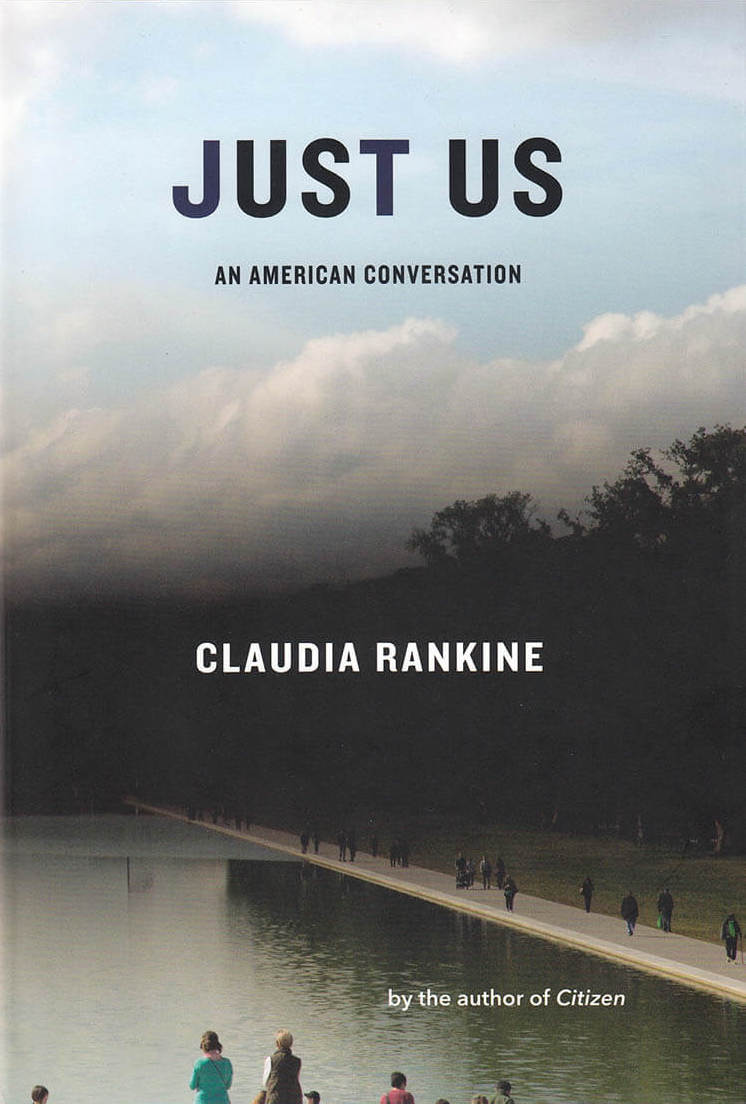
Just Us: An American Conversation
In Just Us, Claudia Rankine invites us into a necessary conversation about Whiteness in America. What would it take for us to breach the silence, guilt, and violence that arise from addressing Whiteness for what it is? What are the consequences if we keep avoiding this conversation? What might it look like if we step into it? "I learned early that being right pales next to staying in the room," she writes.
This brilliant assembly of essays, poems, documents, and images disrupts the false comfort of our culture's liminal and private spaces—the airport, the theater, the dinner party, the voting booth—where neutrality and politeness deflect true engagement in our shared problems. Rankine makes unprecedented art out of the actual voices and rebuttals of others: White men responding to, and with, their White male privilege; a friend clarifying her unexpected behavior at a play; and women on the street expressing the political currency of dyeing their hair blond, all running alongside fact-checked notes and commentary that complement Rankine's own text, complicating notions of authority and who gets the last word. Funny, vulnerable, and prescient, Just Us is Rankine's most intimate and urgent book, a crucial call to challenge our vexed reality.
Claudia Rankine is a poet, an essayist, and a playwright. Just Us completes her groundbreaking trilogy, following Don't Let Me Be Lonely and Citizen. She is a MacArthur Fellow and teaches at New York University.
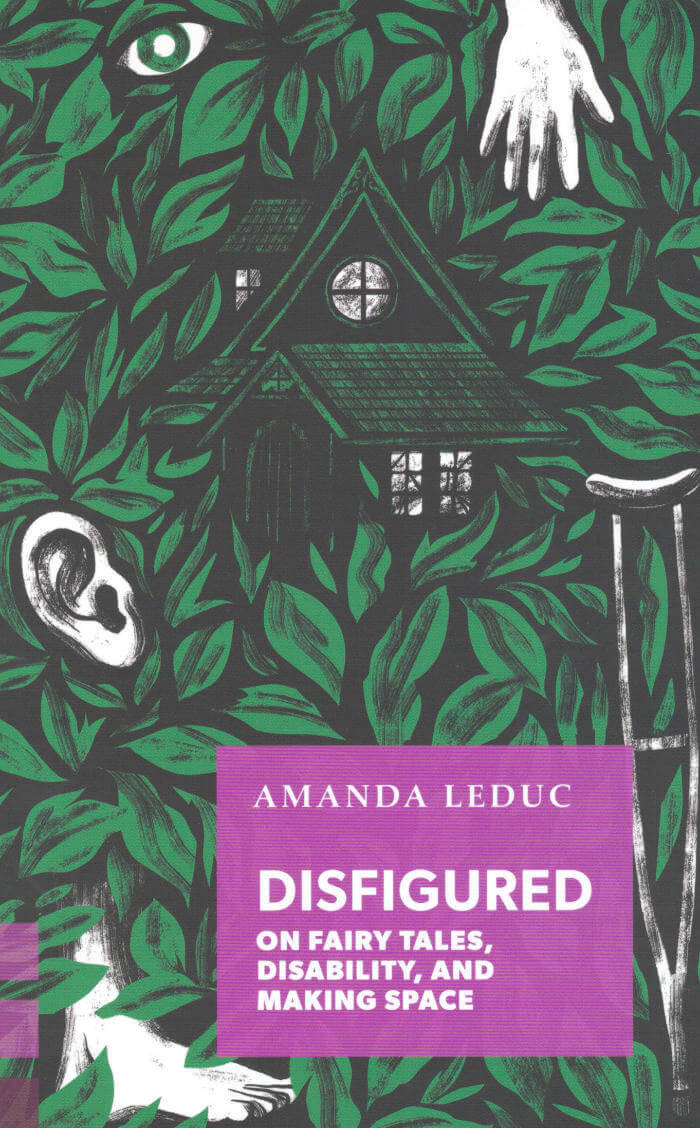
Disfigured: On Fairy Tales, Disability, and Making Space
Challenges the ableism of fairy tales and offers new ways to celebrate the magic of all bodies. In fairy tales, happy endings are the norm - as long as you're beautiful and walk on two legs. After all, the ogre never gets the princess. And since fairy tales are the foundational myths of our culture, how can a girl with a disability ever think she'll have a happy ending? By examining the ways that fairy tales have shaped our expectations of disability, Disfigured will point the way toward a new world where disability is no longer a punishment or impediment but operates, instead, as a way of centering a protagonist and helping them to cement their own place in a story, and from there, the world.
Through the book, Leduc ruminates on the connections we make between fairy tale archetypes - the beautiful princess, the glass slipper, the maiden with long hair lost in the tower - and tries to make sense of them through a twenty-first-century disablist lens. From examinations of disability in tales from the Brothers Grimm and Hans Christian Andersen through to modern interpretations ranging from Disney to Angela Carter, and the fight for disabled representation in today's media, Leduc connects the fight for disability justice to the growth of modern, magical stories, and argues for increased awareness and acceptance of that which is other - helping us to see and celebrate the magic inherent in different bodies.
Amanda Leduc's essays and stories have appeared in publications across Canada, the US, and the UK. She is the author of the novels The Miracles of Ordinary Men and the forthcoming The Centaur's Wife . She has cerebral palsy and lives in Hamilton, Ontario, where she works as the Communications Coordinator for the Festival of Literary Diversity (FOLD), Canada's first festival for diverse authors and stories.